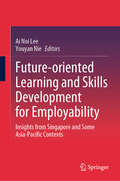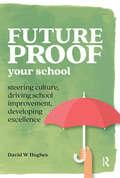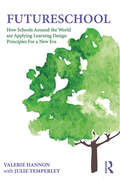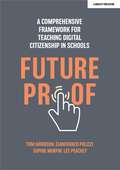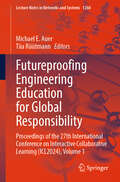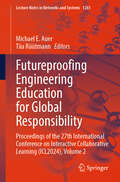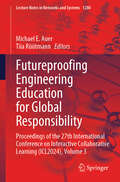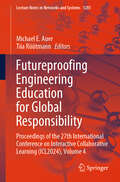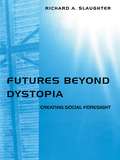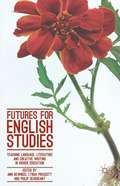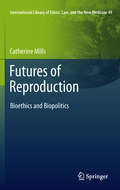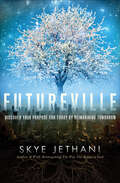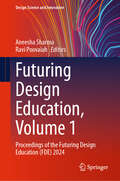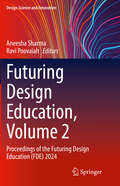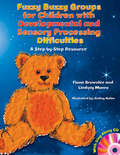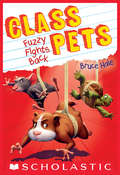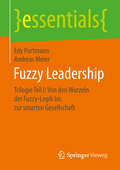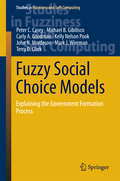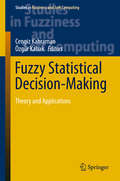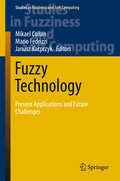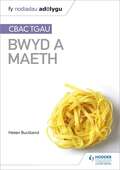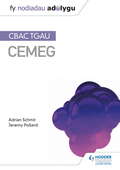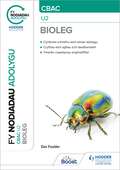- Table View
- List View
Future-oriented Learning and Skills Development for Employability: Insights from Singapore and Some Asia-Pacific Contexts
by Ai Noi Lee Youyan NieThis book examines evolving trends in pre-employment and continuing education, focusing on how formal learning affects learners’ skills, career motivation, and work readiness. It also addresses adult workers’ skills development, continuous training and workplace learning, highlighting key enablers, barriers and factors influencing their motivation and employability. Drawing on insights from experienced scholars and practitioners from Singapore and some Asia-Pacific contexts, including Australia, Bangladesh, and China, the book uniquely integrates the synergy between pre-employment and continuing education, offering a deeper understanding of their interconnectedness in fostering a sustainable workforce. As a comprehensive resource, it provides valuable insights for advancing higher education, vocational training, continuing education, workplace learning, and workforce development.
Future-proof Your School: Steering culture, driving school improvement, developing excellence (Practical Teaching)
by David HughesWouldn’t it be great if you could equip your school and yourself to face whatever the future might throw at you!Schools face myriad calls on their time and creativity yet have finite internal resources to respond to them. This can result in piecemeal changes, and reactive rather than pro-active approaches. This book reduces, filters and prioritises the demands on staff energy to the central task of all schools - to achieve the best engagement of and learning outcomes for all learners (including the staff themselves).Schools often feel constrained by their current context, their previous performance, their demographics or available staff. This book provides an holistic and effective approach to change management that is simple, engages all stakeholders, is built around the current expertise and culture of the school and, most importantly, is sustainable.It is suitable for headteachers, senior or aspiring leaders, and those driving change through initiatives, but also individual teachers who are interested in effective practice as a route towards personal well-being and professional satisfaction.
FutureSchool: How Schools Around the World are Applying Learning Design Principles For a New Era
by Julie Temperley Valerie HannonWhat will the schools of the future look like? What will guide their design, and what is happening now to create them? As we enter the age of disruption and hyperchange, it has become increasingly clear that our education systems are not adequate to the task of enabling young people to thrive in a very different future. FutureSchool offers system leaders, principals, and teachers research-based design principles upon which the evolution of schools might be based. Shaped by an awareness of changing economies, technology, and the climate emergency, it suggests specific ways that leaders can address the challenges of moving forward, grasping the opportunities presented by the disruption of the COVID-19 pandemic. Presenting six ‘archetypes for the future’ – key missions that are central to the future of humanity – it offers inspiring examples of practice that are not just theoretical but well-advanced in schools across the world, practice that is grounded in principles that are central to a new learning paradigm. This book offers an answer and presents a vision that is engaging, inspiring, and intent on enabling success for all learners. This book will provide inspiration and practical guidance for leaders, teachers, and parents who want to see schools rapidly evolve to become the institutions we really need.
Futureproof: A comprehensive framework for teaching digital citizenship in schools
by Tom Harrison Gianfranco Polizzi Lee Peachey Sophie MurfinFutureproof shows school leaders and teachers how they can educate for digital citizenship through the adoption of a new, comprehensive and coherent framework. The book addresses a gap as there are currently no well-known frameworks that provide a comprehensive approach to teaching digital citizenship education in UK schools. This is surprising given how digital technologies are part and parcel of most young people’s lives today and will continue to be so in the future. Given that the technologies are constantly changing, it might be said that those responsible for teaching digital citizenship are shooting in the dark whilst trying to hit a moving target. The book brings clarity by explaining the theory and research behind the Futureproof framework, and through its focus on how it can be implemented in primary and secondary schools. The book includes details of the digital citizenship framework, an overview of learning and teaching outcomes and examples from practice throughout.
Futureproof: A comprehensive framework for teaching digital citizenship in schools
by Tom Harrison Gianfranco Polizzi Lee Peachey Sophie MurfinFutureproof shows school leaders and teachers how they can educate for digital citizenship through the adoption of a new, comprehensive and coherent framework. The book addresses a gap as there are currently no well-known frameworks that provide a comprehensive approach to teaching digital citizenship education in UK schools. This is surprising given how digital technologies are part and parcel of most young people’s lives today and will continue to be so in the future. Given that the technologies are constantly changing, it might be said that those responsible for teaching digital citizenship are shooting in the dark whilst trying to hit a moving target. The book brings clarity by explaining the theory and research behind the Futureproof framework, and through its focus on how it can be implemented in primary and secondary schools. The book includes details of the digital citizenship framework, an overview of learning and teaching outcomes and examples from practice throughout.
Futureproofing Engineering Education for Global Responsibility: Proceedings of the 27th International Conference on Interactive Collaborative Learning (ICL2024), Volume 1 (Lecture Notes in Networks and Systems #1260)
by Michael E. Auer Tiia RüütmannThis book contains papers in the fields of: Collaborative learning. Digital transition in education. AI and learning analytics in engineering education. Diversity in engineering education. The authors are currently witnessing a significant transformation in the development of education on all levels and especially in post-secondary and higher education. To face these challenges, higher education must find innovative and effective ways to respond in a proper way. Changes have been made in the way we teach and learn, including the massive use of new means of communication, such as videoconferencing and other technological tools. Moreover, the current explosion of artificial intelligence tools is challenging teaching practices maintained for centuries. Scientifically based statements as well as excellent best practice examples are necessary for effective teaching and learning engineering. The 27th International Conference on Interactive Collaborative Learning (ICL2024) and 53rd Conference of International Society for Engineering Pedagogy (IGIP), which took place in Tallinn, Estonia, between 24 and 27 September 2024, was the perfect place where current trends in higher education were presented and discussed. IGIP conferences have been held since 1972 on research results and best practices in teaching and learning from the point of view of engineering pedagogy science. ICL conferences have been held since 1998 being devoted to new approaches in learning with a focus on collaborative learning in Higher Education. Nowadays, the ICL conferences are a forum of the exchange of relevant trends and research results as well as the presentation of practical experiences in learning and Engineering Pedagogy. In this way, the authors try to bridge the gap between ‘pure’ scientific research and the everyday work of educators. Interested readership includes policymakers, academics, educators, researchers in pedagogy and learning theory, schoolteachers, learning industry, further and continuing education lecturers, etc.
Futureproofing Engineering Education for Global Responsibility: Proceedings of the 27th International Conference on Interactive Collaborative Learning (ICL2024), Volume 2 (Lecture Notes in Networks and Systems #1261)
by Michael E. Auer Tiia RüütmannThis book contains papers in the fields of: Collaborative learning. Digital transition in education. AI and learning analytics in engineering education. Diversity in engineering education. The authors are currently witnessing a significant transformation in the development of education on all levels and especially in post-secondary and higher education. To face these challenges, higher education must find innovative and effective ways to respond in a proper way. Changes have been made in the way we teach and learn, including the massive use of new means of communication, such as videoconferencing and other technological tools. Moreover, the current explosion of artificial intelligence tools is challenging teaching practices maintained for centuries. Scientifically based statements as well as excellent best practice examples are necessary for effective teaching and learning engineering. The 27th International Conference on Interactive Collaborative Learning (ICL2024) and 53rd Conference of International Society for Engineering Pedagogy (IGIP), which took place in Tallinn, Estonia, between 24 and 27 September 2024, was the perfect place where current trends in higher education were presented and discussed. IGIP conferences have been held since 1972 on research results and best practices in teaching and learning from the point of view of engineering pedagogy science. ICL conferences have been held since 1998 being devoted to new approaches in learning with a focus on collaborative learning in Higher Education. Nowadays, the ICL conferences are a forum of the exchange of relevant trends and research results as well as the presentation of practical experiences in learning and Engineering Pedagogy. In this way, the authors try to bridge the gap between ‘pure’ scientific research and the everyday work of educators. Interested readership includes policymakers, academics, educators, researchers in pedagogy and learning theory, schoolteachers, learning industry, further and continuing education lecturers, etc.
Futureproofing Engineering Education for Global Responsibility: Proceedings of the 27th International Conference on Interactive Collaborative Learning (ICL2024), Volume 3 (Lecture Notes in Networks and Systems #1280)
by Michael E. Auer Tiia RüütmannThis book contains papers in the fields of: Green transition in education. New generation of engineering students. Entrepreneurship in engineering education. Open education best practices. Project-based learning (PBL). Teaching best practices. We are currently witnessing a significant transformation in the development of education on all levels and especially in post-secondary and higher education. To face these challenges, higher education must find innovative and effective ways to respond in a proper way. Changes have been made in the way we teach and learn, including the massive use of new means of communication, such as videoconferencing and other technological tools. Moreover, the current explosion of artificial intelligence tools is challenging teaching practices maintained for centuries. Scientifically based statements as well as excellent best practice examples are necessary for effective teaching and learning engineering. The 27th International Conference on Interactive Collaborative Learning (ICL2024) and 53rd Conference of International Society for Engineering Pedagogy (IGIP), which took place in Tallinn, Estonia, between September 24 and 27, 2024, was the perfect place where current trends in Higher Education were presented and discussed. IGIP conferences have been held since 1972 on research results and best practices in teaching and learning from the point of view of engineering pedagogy science. ICL conferences have been held since 1998 being devoted to new approaches in learning with a focus on collaborative learning in higher education. Nowadays, the ICL conferences are a forum of the exchange of relevant trends and research results as well as the presentation of practical experiences in learning and engineering pedagogy. In this way, we try to bridge the gap between ‘pure’ scientific research and the everyday work of educators. Interested readership includes policymakers, academics, educators, researchers in pedagogy and learning theory, schoolteachers, learning industry, further and continuing education lecturers, etc.
Futureproofing Engineering Education for Global Responsibility: Proceedings of the 27th International Conference on Interactive Collaborative Learning (ICL2024), Volume 4 (Lecture Notes in Networks and Systems #1281)
by Michael E. Auer Tiia RüütmannThis book contains papers in the fields of: Virtual and augmented learning. Games in engineering education. Social aspects of digitalization. Technical teacher training. Accessible learning and technologies. Dance of data in educational science and practice. Engineering education for production and service structures of the future. Innovative approaches to STEAM education and music therapy through emerging technologies. We are currently witnessing a significant transformation in the development of education on all levels and especially in post-secondary and higher education. To face these challenges, higher education must find innovative and effective ways to respond in a proper way. Changes have been made in the way we teach and learn, including the massive use of new means of communication, such as videoconferencing and other technological tools.
Futures Beyond Dystopia: Creating Social Foresight (Futures In Education Ser.)
by Richard A. SlaughterHow can dystopian futures help provide the motivation to change the ways we operate day to day?Futures Beyond Dystopia takes the view that the dominant trends in the world suggest a long-term decline into unliveable Dystopian futures. The human prospect is therefore very challenging, yet the perception of dangers and dysfunctions is the first step towards dealing with them. The motivation to avoid future dangers is matched by the human need to create plans and move forward. These twin motivations can be very powerful and help to stimulate the fields of Futures Studies and Applied Foresight.This analysis of current Futures practice is split into six sections:* The Case Against Hegemony* Expanding and Deepening a Futures Frame* Futures Studies and the Integral Agenda* Social Learning through Applied Foresight* Strategies and Outlooks* The Dialectic of Foresight and Experience.This fascinating book will stimulate anyone involved in Futures work around the world and will challenge practitioners and others to re-examine many of their assumptions, methodologies and practices.
Futures for English Studies: Teaching Language, Literature And Creative Writing In Higher Education
by Philip Seargeant Lynda Prescott Ann HewingsFutures for English Studies brings together chapters by leading writers across the curriculum area of English to investigate how the component parts of English (literature, language, and creative writing) are located institutionally in higher education and to explore the interdisciplinary prospects of a subject which spans the humanities and social sciences. Through explorations of changing foci in a variety of contexts, the book examines the value and purpose of teaching and researching English language, literature and creative writing in the twenty-first century, both within Anglophone countries and the wider world. The contributors, all practicing educators and researchers in the field, bring a wide range of perspectives to the theme of the development of the discipline, and illustrate that the strengths of English Studies as an academic subject lie not only in its traditional breadth and depth, but also in a readiness to adapt, experiment, and engage with other subjects.
Futures of Reproduction
by Catherine MillsIssues in reproductive ethics, such as the capacity of parents to 'choose children', present challenges to philosophical ideas of freedom, responsibility and harm. This book responds to these challenges by proposing a new framework for thinking about the ethics of reproduction that emphasizes the ways that social norms affect decisions about who is born. The book provides clear and thorough discussions of some of the dominant problems in reproductive ethics - human enhancement and the notion of the normal, reproductive liberty and procreative beneficence, the principle of harm and discrimination against disability - while also proposing new ways of addressing these. The author draws upon the work of Michel Foucault, especially his discussions of biopolitics and norms, and later work on ethics, alongside feminist theorists of embodiment to argue for a new bioethics that is responsive to social norms, human vulnerability and the relational context of freedom and responsibility. This is done through compelling discussions of new technologies and practices, including the debate on liberal eugenics and human enhancement, the deliberate selection of disabilities, PGD and obstetric ultrasound.
Futureville: Discover Your Purpose for Today by Reimagining Tomorrow
by Skye JethaniWant to see the future? It is brighter than you think.What we believe about tomorrow determines how we live today. As Christians debate how to faithfully engage with our rapidly changing world, our vision of the future has never been more important.But rather than providing a clear sense of purpose for our lives, popular Christian ideas about the future steal it from us by saying our work in the world, apart from ministry, has no eternal value. Is it any wonder why young adults are less interested in church, or why a culture desperate for meaning and hope dismisses our message? In Futureville, Skye Jethani offers us a vision-shifting glimpse of the world of tomorrow described in Scripture. He reveals how a biblical vision of the future can transform every person’s work with a sense of purpose and dignity today.Futureville is a smart, inspiring call to cultivate the order, beauty, and abundance that reflects the heart and vision of God for our world.
Futuring Design Education, Volume 1: Proceedings of the Futuring Design Education (FDE) 2024 (Design Science and Innovation)
by Ravi Poovaiah Aneesha SharmaThis book presents select proceedings of the two-day conference titled Futuring Design Education (FDE 2024), and it examines the transformation of design knowledge, the evolving spaces of learning, and the ecosystems of teaching and learning. The topics covered include the pedagogical model of design education, the experiments, and technological advances that impact design education. The book also discusses the roles and challenges of learning spaces, remote learning in digital spaces, and synchronous and asynchronous learning tools. The book will also look at the social contexts in design pedagogy, cultural affiliations and alignments and will allude to any new learning frameworks for design education. The book can be a valuable reference for design educators, design researchers, and professionals interested in design education.
Futuring Design Education, Volume 2: Proceedings of the Futuring Design Education (FDE) 2024 (Design Science and Innovation)
by Ravi Poovaiah Aneesha SharmaThis book presents select proceedings of the two-day conference titled Futuring Design Education (FDE 2024), and it examines the transformation of design knowledge, the evolving spaces of learning, and the ecosystems of teaching and learning. The topics covered include the pedagogical model of design education, the experiments, and technological advances that impact design education. The book also discusses the roles and challenges of learning spaces, remote learning in digital spaces, and synchronous and asynchronous learning tools. The book will also look at the social contexts in design pedagogy, cultural affiliations and alignments and will allude to any new learning frameworks for design education. The book can be a valuable reference for design educators, design researchers, and professionals interested in design education.
Fuzzy Buzzy Groups for Children with Developmental and Sensory Processing Difficulties
by Fiona Brownlee Lindsay MunroChildren with sensory and cognitive difficulties can struggle to interact with their peers, be easily distracted, and have problems coping with change. Fuzzy Buzzy Groups for Children with Developmental and Sensory Processing Difficulties has been devised to address the needs of children with sensory processing difficulties and development delay in specialist and inclusive settings. This easy-to-follow resource will enable professionals to engage with children in a relaxed and fun way that explores sensory experiences. It contains everything you need to run a Fuzzy Buzzy group: from advice for choosing sensory food and drink and criteria for selecting suitable children, to tips for involving parents in the group and sourcing sensory materials. The authors guide you step-by-step through how to carry out a session, and include photocopiable forms and checklists as well as a sing-along CD containing music to use with the group. This resource will help children not just to explore sensory experiences, but also to learn to share, take turns, listen, interact with their peers and improve their self-esteem. The eight-session programme is ideally suited to children aged 2-5, although this can be adapted to suit individual needs, and is perfect for early years' practitioners, teachers, teaching assistants, family respite carers and other professionals working with young children.
Fuzzy Fights Back (Class Pets #4)
by Bruce HaleWill Fuzzy and his friends be able to fight against a plan to ban class pets, or will they be thrown out like yesterday's juice box?Is this the end of class pets?When Fuzzy accidentally gets a kid hurt, he feels awful. But worse -- the PTA president demands to get rid of all the class pets!Fuzzy and his friends get to work. A cuteness campaign? Their selfies fall short. A hunger strike? The pets get hungry. Could the PTA president's daughter be the key to staying in their classrooms, or will the pets get thrown out like yesterday's juice box?
Fuzzy Leadership: Trilogie Teil I: Von den Wurzeln der Fuzzy-Logik bis zur smarten Gesellschaft (essentials)
by Edy Portmann Andreas MeierDie unscharfe Logik (Fuzzy Logic) erweitert die klassische Logik, indem neben den beiden Wahrheitswerten 1 für ‚wahr’ und 0 für ‚falsch’ alle Werte des Einheitsintervalls zugelassen sind. Die unscharfe Logik entspricht der menschlichen Wahrnehmung, da sie unsichere Sachverhalte oder vage Aussagen in einem Entscheidungsprozess mitberücksichtigt. Edy Portmann und Andreas Meier geben in diesem essential über Fuzzy Leadership einen Überblick zu Grundlagen der unscharfen Logik und zeigen das Potenzial in unterschiedlichen Anwendungen der digitalen Wirtschaft sowie in der Informations- und Wissensgesellschaft auf. Die Autoren:Prof. Dr. Edy Portmann ist Swiss Post Professor of Computer Science am Human-IST Institut der Universität Fribourg, Schweiz. In seiner Forschung beschäftigt er sich mit Fragen rund um Informationssysteme, -verarbeitung und -beschaffung. Prof. Dr. Andreas Meier leitete in den Jahren 1999 bis 2018 den Lehrstuhl für Wirtschaftsinformatik an der Universität Fribourg, Schweiz. Seine Forschungsgebiete waren eBusiness, eGovernment und Informationsmanagement.
Fuzzy Social Choice Models
by Peter C. Casey Michael B. Gibilisco Carly A. Goodman Kelly Nelson Pook John N. Mordeson Mark J. Wierman Terry D. ClarkThis book explores the extent to which fuzzy set logic can overcome some of the shortcomings of public choice theory, particularly its inability to provide adequate predictive power in empirical studies. Especially in the case of social preferences, public choice theory has failed to produce the set of alternatives from which collective choices are made. The book presents empirical findings achieved by the authors in their efforts to predict the outcome of government formation processes in European parliamentary and semi-presidential systems Using data from the Comparative Manifesto Project (CMP), the authors propose a new approach that reinterprets error in the coding of CMP data as ambiguity in the actual political positions of parties on the policy dimensions being coded. The range of this error establishes parties' fuzzy preferences. The set of possible outcomes in the process of government formation is then calculated on the basis of both the fuzzy Pareto set and the fuzzy maximal set, and the predictions are compared with those made by two conventional approaches as well as with the government that was actually formed. The comparison shows that, in most cases, the fuzzy approaches outperform their conventional counterparts.
Fuzzy Statistical Decision-Making
by Cengiz Kahraman Özgür KabakThis book offers a comprehensive reference guide to fuzzy statistics and fuzzy decision-making techniques. It provides readers with all the necessary tools for making statistical inference in the case of incomplete information or insufficient data, where classical statistics cannot be applied. The respective chapters, written by prominent researchers, explain a wealth of both basic and advanced concepts including: fuzzy probability distributions, fuzzy frequency distributions, fuzzy Bayesian inference, fuzzy mean, mode and median, fuzzy dispersion, fuzzy p-value, and many others. To foster a better understanding, all the chapters include relevant numerical examples or case studies. Taken together, they form an excellent reference guide for researchers, lecturers and postgraduate students pursuing research on fuzzy statistics. Moreover, by extending all the main aspects of classical statistical decision-making to its fuzzy counterpart, the book presents a dynamic snapshot of the field that is expected to stimulate new directions, ideas and developments.
Fuzzy Technology
by Mikael Collan Mario Fedrizzi Janusz KacprzykThisbook provides readers with a timely and comprehensive yet concise view on the field of fuzzy logic and its real-world applications. The chapters, writtenby authoritative scholars in the field, report on promising new models for dataanalysis, decision making, and systems modeling, with a special emphasis on theirapplications in management science. The book is a token of appreciation from the fuzzy researchcommunity to Professor Christer Carlsson for his long time research and organizationalcommitment, which have among other things resulted in the foundation and success of theInstitute for Advanced Management Systems Research (IAMSR) at Åbo Akademi University, in Åbo(Turku), Finland. The book serves as timely guide for the fuzzy logic andoperations research communities alike.
Fy Nodiadau Adolygu (My Revision Notes (My Revision Notes (My Revision Notes (My Revision Notes: WJEC GCSE Food and Nutrition Welsh-language edition): Cbac Tga Bwyd A Maeth(mrn:gcse Food And Nut)epb
by Helen BucklandExam Board: WJECLanguage: WelshLevel: GCSESubject: Food PreparationFirst Teaching: September 2016First Exam: Summer 2018Unlock your full potential with this revision guide that will guide you through the content and skills you need to succeed in the WJEC GCSE Food Preparation and Nutrition exam.- Plan your own revision and focus on the areas you need to revise with key fact summaries and revision activities for every topic.- Use the exam tips to clarify key points and avoid making typical mistakes.- Test yourself with end-of-topic questions and answers and tick off each topic as you complete it.- Get ready for the exam with tips on approaching the paper, and sample exam questions with model answers and commentary.
Fy Nodiadau Adolygu (My Revision Notes: Wjec Gcse Chemistry Welsh Edition Epub
by Jeremy Pollard Adrian SchmitTarget success in Science with this proven formula for effective, structured revision; key content coverage is combined with exam-style tasks and practical tips to create a revision guide that students can rely on to review, strengthen and test their knowledge.With My Revision Notes, every student can:- Plan and manage a successful revision programme using the topic-by-topic planner- Consolidate subject knowledge by working through clear and focused content coverage- Test understanding and identify areas for improvement with regular 'Now Test Yourself' tasks and answers- Improve exam technique through practice questions, expert tips and examples of typical mistakes to avoid- Get exam ready with extra quick quizzes and answers to the practice questions available online
Fy Nodiadau Adolygu: CBAC Bioleg U2 (My Revision Notes: WJEC/Eduqas A-Level Year 2 Biology)
by Dan FoulderTarget exam success with My Revision Notes.Our updated approach to revision will help you learn, practise and apply your skills and understanding. Coverage of key content from Year 2 is combined with practical study tips and effective revision strategies to create a guide you can rely on to build both knowledge and confidence.My Revision Notes: WJEC/Eduqas A-level Biology will help you:- Develop your subject knowledge by making links between topics for more in-depth exam answers- Practise and apply your skills and knowledge with exam-style questions and frequent 'Now Test Yourself' questions with answer guidance online- Improve maths skills with helpful reminders and tips accompanied by worked examples- Avoid common mistakes and enhance your exam answers with 'Examiner tips'- Build quick recall with bullet-pointed summaries at the end of each chapter- Understand key terms you will need for the exam with user-friendly definitions and a glossary- Plan and manage your revision with our topic-by-topic planner and exam breakdown introduction
Fy Nodiadau Adolygu: CBAC Bioleg U2 (My Revision Notes: WJEC/Eduqas A-Level Year 2 Biology)
by Dan FoulderTarget exam success with My Revision Notes.Our updated approach to revision will help you learn, practise and apply your skills and understanding. Coverage of key content from Year 2 is combined with practical study tips and effective revision strategies to create a guide you can rely on to build both knowledge and confidence.My Revision Notes: WJEC/Eduqas A-level Biology will help you:- Develop your subject knowledge by making links between topics for more in-depth exam answers- Practise and apply your skills and knowledge with exam-style questions and frequent 'Now Test Yourself' questions with answer guidance online- Improve maths skills with helpful reminders and tips accompanied by worked examples- Avoid common mistakes and enhance your exam answers with 'Examiner tips'- Build quick recall with bullet-pointed summaries at the end of each chapter- Understand key terms you will need for the exam with user-friendly definitions and a glossary- Plan and manage your revision with our topic-by-topic planner and exam breakdown introduction
